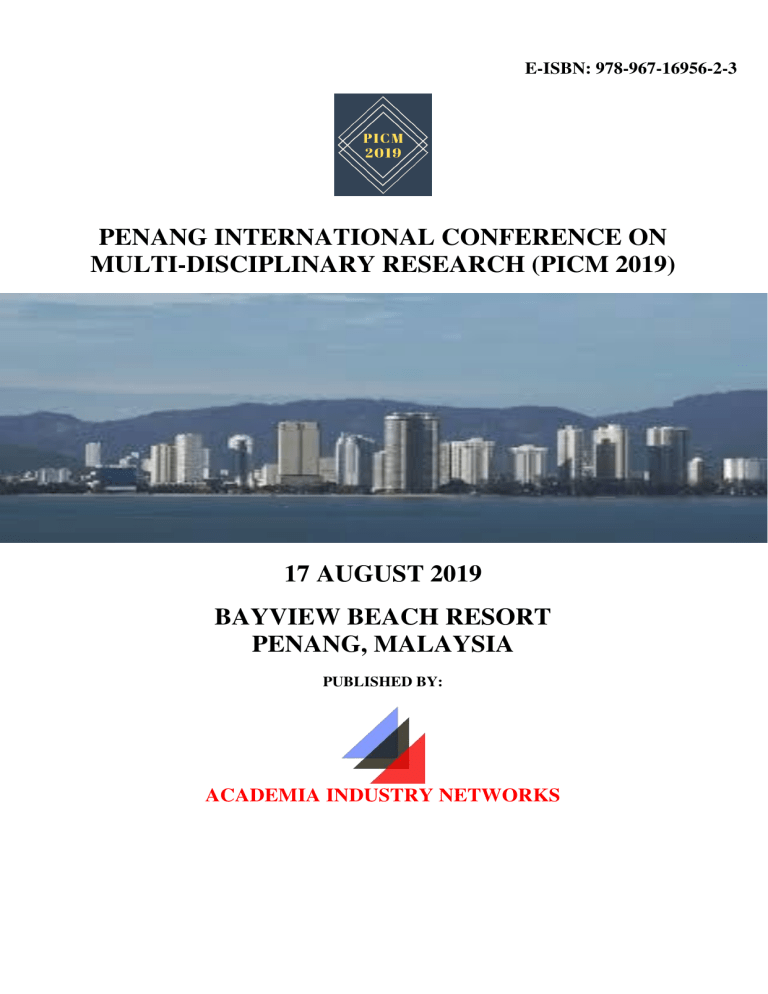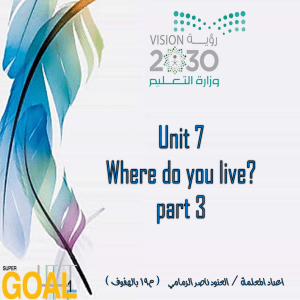
E-ISBN: 978-967-16956-2-3 PENANG INTERNATIONAL CONFERENCE ON MULTI-DISCIPLINARY RESEARCH (PICM 2019) 17 AUGUST 2019 BAYVIEW BEACH RESORT PENANG, MALAYSIA PUBLISHED BY: ACADEMIA INDUSTRY NETWORKS Published by: Academia Industry Networks (002911676-U) Kajang, Selangor, Malaysia 2 ACADEMIA INDUSTRY NETWORKS Proceeding: Penang International Conference on Multi-Disciplinary Research (PICM 2019) Bayview Beach Resort, Penang, Malaysia (E-ISBN: 978-967-16956-2-3) MOTIVATION IN LANGUAGE LEARNING: HOW TO SUCCEED IN KEEPING EFL LEARNERS MOTIVATED? Urarat Parnrod1* 1 Faculty of Humanities and Social Sciences, Songkhla Rajabhat University, Songkhla, Thailand *Corresponding Author: urarat.parnrod@gmail.com ________________________________________________________________________________________ Abstract: The study investigated the level of motivation of 52 EFL undergraduate students. Attitude/ Motivation Test Battery (AMTB) developed by Gardner (2004), was used to collect quantitative data for the study. Open-ended questions were also added to reveal the problems the students encountered while learning and their preferred motivational teaching strategies to keep them motivated in language learning. It is expected that the results of the study would be used as a guideline for developing teaching methods, for example, designing an activity or a task to suit English-major students or others in different majors with different levels of motivation in order to boost the students’ effective learning, and balancing between the students’ motivation and the course objectives. Keywords: motivation, EFL undergraduate students ___________________________________________________________________________ 1. Introduction Although Thai students study English more than ten years, it was found that they still have low English proficiency and achievement (Ministry of Education, 2008. Several possible solutions have been proposed by researchers and educators (Williams & Burden, 1997; Brown, 2000; Kullavanijaya, 2009; Asmali, 2017). Among those, ‘motivation’ is stated as an effective factor to enhance learners for becoming successful in language learning (Gardner, 1985; 2004; Harmer, 2004). Therefore, the next section describes more information about motivation and previous research relating to the students’ motivation. 2. Literature Review 2.1 Background of Motivation Several researchers have defined ‘motivation’ in language learning context, for example, the main factor which goes along with language aptitude and influence on success in learning a foreign language in a classroom setting (Gardner, 1985); and a tool which can motivate us to be moved to do something (Ryan & Deci, 2000, p.54). Among several definitions, motivation is related to an effort and desire plus a positive attitude to achieve the goal of language learning (Gardner, 1985). Among different types of motivation describing different purposes for language learning, Gardner’s theory (1985) was selected for the study because it could cover the possible common reasons (i.e. using smoothly while interacting with the native speakers in the real situation and having better job after graduating) for learning language Gardner (1985) stated that “integrative and instrumental motivation represent the ultimate goals for achieving the 156 ACADEMIA INDUSTRY NETWORKS Proceeding: Penang International Conference on Multi-Disciplinary Research (PICM 2019) Bayview Beach Resort, Penang, Malaysia (E-ISBN: 978-967-16956-2-3) more immediate goal of learning the second or foreign language” (p. 11. Integrative Motivation is defined as a complex of attitudinal goal directed and motivational attributes which motivate learners to learn language for communicating with people from different cultures who speak that language” (Gardner & Lambert, 1972; Gardner, 1985, p.9). On the other hand, instrumental motivation is the desire to learn a language because it would fulfill a certain utilitarian goal or for functional reasons, such as getting a job, passing an examination, and getting a higher salary (Gardner & Lambert, 1972). The next section describes previous studies on motivation. 2.2 Related Studies Previous studies related to motivation have generally been conducted over the time. A number of researches will show below: Wimolmas (2013) investigated the level of motivation, integrative and instrumental in particular, of 30 first-year undergraduate students at an international institute of engineering and technology in Thailand. Gardner’s Attitude/ Motivation Test Battery (AMTB) was adapted to collect the data for the study. The findings showed that the students are relatively “highly” motivated and found to be slightly more “instrumentally” motivated to learn English. Nasatorn (2015) explored i) the preferred classroom activities while learning English of 458 grade 9 Thai EFL secondary school students in Kalasin Primary Educational Service Area, Office 2, in northeastern Thailand, and ii) the level of motivation of those students while learning English. The Classroom Activities Questionnaire and Attitude/Motivation Test Battery (AMTM) were used as the instruments for the study. The major results show that grade 9 students preferred to participate in participation mode activities at a high level and they have high instrumental orientation to learn English. Khong, Hassan and Ramli (2017) identified the student motivation and gender differences in learning Spanish as a foreign language in the Malaysian context. The participants for the study were 448 students from Universiti Kuala Lumpur Malaysian Spanish Institute where Spanish is a compulsory subject. The student motivation was measured by using questionnaire based on Gardner’s social psychological model. The findings showed that the students were highly motivated toward learning Spanish. No significant differences were found between integrative and instrumental motivations and gender. 157 ACADEMIA INDUSTRY NETWORKS Proceeding: Penang International Conference on Multi-Disciplinary Research (PICM 2019) Bayview Beach Resort, Penang, Malaysia (E-ISBN: 978-967-16956-2-3) 3. Problem Statement As presented above, although several studies focused on using quantitative method to identify the level of motivation of the students, it was found that more studies were needed to show in-depth information about the problems undergraduate students encounter while learning and to reveal the students’ preferred motivational teaching strategies. Therefore, this study aimed at investigating the students’ level of motivation, including their problems while learning and their preferred motivational teaching strategies by addressing the questions below: 3.1 Research Questions: 1) What levels of motivation do SKRU ungraduated students have for language learning? 2) What problems do the students encounter while learning language? 3) What motivational teaching strategies do the students prefer? 4. Method For the study, 52 out of 56 undergraduate students (93%) were participants. They were the first year students majoring in English at Songkhla Rajabhat University (SKRU) and their age was between 19 and 21. 4.1 Data Collection The Attitude/Motivation Test Battery (AMTB) developed by Gardner (2004) was used to collect the data for the study. It is a questionnaire consisting of 12 domains and 104 subitems. Since the study mainly paid attention to developing teaching methods to succeed in keeping the students motivated while learning language, the two domains, integrative orientation (four items) and instrumental orientation (four items) (see example in Appendix A) related to the students’ purposes for their language learning were the focus of the study. With regard to identifying the students’ motivation in language learning, they were required to choose the response (6, 5, 4, 3, 2, or 1) which best indicate the extent to which they agree or disagree with each item. The criteria for the response are presented in Table. Table 1: Criteria for Evaluation Motivation (Garder, 2004) Level Average Mean Scores Scale 1 Low 1.00 – 3.09 2 Moderately disagree 3 Slightly disagree 4 Slightly agree 5 Moderately agree 6 Strongly agree High 3.10 – 6.00 Description Strongly disagree In order to gain in-depth information, two open-ended questions were added in the questionnaire to reveal problems and preferred activities while learning language. 158 ACADEMIA INDUSTRY NETWORKS Proceeding: Penang International Conference on Multi-Disciplinary Research (PICM 2019) Bayview Beach Resort, Penang, Malaysia (E-ISBN: 978-967-16956-2-3) The questionnaire was translated into Thai and piloted on 10 SKRU students (excluding the population for the study) to check their understanding of the items. After that, the questionnaire was revised based on the comments from the pilot study and distributed to the participants of the study. As for the first part of the questionnaire, the quantitative data was analysed by using descriptive statistics to show the proportion between the students having integrative orientation and instrumental orientation. Regarding, the second part, the problems and preferred activities presented by the students were categorized to show more detailed information. 5. Results and Discussion Research Question 1: What levels of motivation do SKRU ungraduated students have for language learning? The data obtained from the questionnaire showed the levels of motivation by 52 SKRU undergraduate students in Table 2. Table 2: SKRU Undergraduate Students’ Levels of Motivation Motivation 1. Studying English is important because it will allow me to be more at ease with people who speak English. M 5.56 SD 0.75 Level High 2. Studying English is important because I will need it for my career. 5.75 0.59 High 3. Studying English is important because it will allow me to meet and converse with more and varied people. 5.65 0.62 High 4. Studying English is important because it will make me more educated. 5.52 0.73 High 5. Studying English is important because it will enable me to better understand and appreciate the English way of life. 5.44 0.73 High 6. Studying English is important because it will be useful in getting a good job. 5.40 0.82 High 7. Studying English is important because I will be able to interact more easily with speakers of English. 5.71 0.61 High 8. Studying English is important because other people will respect me more if I know English. 4.98 1.11 High Table 2 shows high level of motivation of the students for language learning. The highest score (M = 5.75) from item 2, ‘Studying English is important because I will need it for my career’, could explain that getting a job after graduating is the main goal which can motivate the students to learn language. To further consider the data, regarding integrative orientation (see Table 3), it was found that item 3, ‘Studying English is important because it will allow me to meet and converse with 159 ACADEMIA INDUSTRY NETWORKS Proceeding: Penang International Conference on Multi-Disciplinary Research (PICM 2019) Bayview Beach Resort, Penang, Malaysia (E-ISBN: 978-967-16956-2-3) more and varied people’, got the highest score (M = 5.65). That would reflect that the students think that English could be a gate to lead them to the wider world through interacting with people from different contexts. Whereas, the highest score for instrumental orientation (see Table 4) was presented above. Table 3: Integrative Orientation of SKRU Undergraduate Students Motivation 1. Studying English is important because it will allow me to be more at ease with people who speak English. M 5.56 SD 0.75 Level High 3. Studying English is important because it will allow me to meet and converse with more and varied people. 5.65 0.62 High 5. Studying English is important because it will enable me to better understand and appreciate the English way of life. 5.44 0.73 High 7. Studying English is important because I will be able to interact more easily with speakers of English. 5.71 0.61 High Table 4: Instrumental Orientation of SKRU Undergraduate Students Motivation 2. Studying English is important because I will need it for my career. M 5.75 SD 0.59 Level High 4. Studying English is important because it will make me more educated. 5.52 0.73 High 6. Studying English is important because it will be useful in getting a good job. 5.40 0.82 High 8. Studying English is important because other people will respect me more if I know English. 4.98 1.11 High Research Question 2: What problems do the students encounter while learning language? The problems raised by the students are summarized below: The students are anxious about their language skills, especially listening, speaking, and grammar skills. The teaching methods are not interesting and cannot enhance them understand the lesson. The students have prior knowledge about the lesson. They are bored when they feel that they do not gain the more or new knowledge. The materials and activities are not interesting. Research Question 3: What motivational teaching strategies do the students prefer? Motivational teaching strategies which the students prefer are summarized as the following: connecting the lesson to their interests outside the class, such as their favourite songs and movies; 160 ACADEMIA INDUSTRY NETWORKS Proceeding: Penang International Conference on Multi-Disciplinary Research (PICM 2019) Bayview Beach Resort, Penang, Malaysia (E-ISBN: 978-967-16956-2-3) requiring to work in pairs and in groups to enhance them learn and share knowledge together; creating the situations in which they can get involved in learning process and gain more opportunities to practice; integrating interesting material and technology to keep them motivated; providing opportunities for their meaningful output, such as speaking to the native speakers in the real situations, do activities with exchange students and hosting exchange students; and re-checking their understanding about the lesson. The findings of the study are similar to those of previous studies (Wong, 2011; Wimolmas, 2013; Nasatorn, 2015) which showed that all items in integrative and instrumental orientations are rated at a high level. Also, the data obtained added the detailed information about the problems undergraduate students encounter while learning and the students’ preferred motivational teaching strategies. 6. Conclusion The findings of the study showed that all items in integrative and instrumental orientations which were rated by first-year undergraduate students majoring in English at Songkhla Rajabhat University are at a high level. It was also found that i) language background, listening, speaking and grammar skills in particular, ii) teaching methods, iii) the content, and iv) materials/ activities are problematic while the students are learning language. Besides, the students revealed their preferred motivational teaching strategies which could keep them motivated for learning language. Those cover i) connecting the lesson to their interests outside the class, ii) requiring to work in pairs and in groups, iii) creating the situations which can stimulate the students involve in learning process, iv) integrating interesting material and technology, v) providing opportunities for the students’ meaningful output, and vi) rechecking the students’ understanding about the lesson. Based on the task-based learning framework developed by Willis (1996), three phases, pretask, task-cycle, and language focus, are proposed. If the teachers know the objectives of each phase, they would make beneficial from the results of the study to suit each objective of the three phases. Consequently, they could design their teaching to keep the students motivated successfully. Regarding pre-task phase, it aims at giving clear detailed instruction. Then the teachers should provide the clear objectives of the lesson, motivate the students to learn by connecting the content of the lesson to what they are familiar with, and explain how the students can gain benefits from learning or doing activities about the lesson. Task cycle phase involves students using language in various circumstances and sharing their output to each other. As for this phase, the teachers should require the students to work in pairs or in groups and allow them to freely choose the ones to work with. That would be an alternative to reduce their anxiety while sharing the knowledge in order to produce the new one. As for this phase, the teacher should also take the role as a ‘facilitator’ to check whether the students understand what they are doing and are on the track. In case the students misunderstand or get lost, the teacher would get them back in time. Also, the teachers could 161 ACADEMIA INDUSTRY NETWORKS Proceeding: Penang International Conference on Multi-Disciplinary Research (PICM 2019) Bayview Beach Resort, Penang, Malaysia (E-ISBN: 978-967-16956-2-3) require the students to use language in the real situation, such as interviewing the foreigners while visiting the famous attractions. The last one, language focus phase, is related to the analysis and practice. The students have an opportunity to ask questions about what they learned. In this phase, the teachers could design material prepare online program, such as online quiz (i.e. EDMODO), to recheck the students’ understand and online brainstorming (i.e. PADLET). Finally, wrapping up should be added to summarize what the students already knew and what they learned more after finishing the lesson. Making beneficial the knowledge the students learned to their real life should be also provided, In conclusion, exploring the several factors, such as the students’ major, prior knowledge in language learning and environment setting, which could affect the level of the students’ motivation would be beneficial in terms of designing motivational teaching strategies. However, more studies which investigated the relationship between the factors in language learning and the level of the motivation and how some factors affect the level of the motivation were needed. References Asmali, M. 92017). Young learners’ attitudes and motivation to learn English. NovitasROYAL (Research on Youth and Language), 11(1), 53-68. Khong, H, Hassan, N. H., & Ramli, N. (2017). Motivation and gender differences in learning Spanish as a foreign language in a Malaysian technical university. Malaysian Journal of Learning and Instruction (MJLI), 14 (2), 59-83. Brown, H. D. (2000). Principles of language learning and teaching. New York: Longman. Gardner, R. C. (1985). Social psychology and second language learning: The role of attitudes and motivation. London: Edward Arnold. Gardner, R. C., & Lambert, W. E. (1972). Attitudes and motivation in second language learning. Rowley: Newbury House. Gardner, R. C. (2004). Attitude/motivation test battery: International AMTB research project. Retrieved from http://publish.uwo.ca/~gardner/docs/englishamtb.pdf Harmer, J. (2004). The practice of English language teaching. London: Longman. Khong, H, Hassan, N. H., & Ramli, N. (2017). Motivation and gender differences in learning Spanish as a foreign language in a Malaysian technical university. Malaysian Journal of Learning and Instruction (MJLI), 14 (2), 59-83. Kullavanijaya, P. (2009). Basic information of teaching and learning, and the needs of foreign language in Thailand. Bangkok: Chulalongkorn University Press Ministry of Education. (2008). Basic education curriculum B.E. 2554 (A.D. 2001). Retrieved from http://academic.obec.go.th/web/doc/d/147%E2%80%8E. Nasatorn, M. (2015). An investigating of classroom activitiesss, motivation, and English language learning strategies of secondary school students in Kalasin Primary Educational Service Area Office 2 (Master of Arts thesis). Retrieved from http://www.grad.mahidol.ac.th/grad/research/abstract_view.php?id=5537401&lang=th& fac=75&prg=7501M&gp=5 162 ACADEMIA INDUSTRY NETWORKS Proceeding: Penang International Conference on Multi-Disciplinary Research (PICM 2019) Bayview Beach Resort, Penang, Malaysia (E-ISBN: 978-967-16956-2-3) Ryan, R. M., and Deci, E. L. (2000). Intrinsic and extrinsic motivations: Classic definitions and new directions. Contemporary Educational Psychology, 25(1), 54-67. Williams, M., & Burden, R. (1997). Psychology for language teachers. Cambridge: Cambridge University Press. Willis, J. (1996). A framework for task-based learning. Harlow: Longman. Wimolmas, R. (2013). A Survey Study of Motivation in English Language Learning of First Year Undergraduate Students at Sirindhorn International Institute of Technology (SIIT). Proceedings in the 3rd International Conference on Foreign Language Teaching and Learning, Thammasat University, Thailand. Wong, Y. M. (2011). A study of instrumental and integrative motivations as factors influencing UTAR third-year Chinese undergraduates in learning ESL (bachelor thesis). Retrieved from UTAR Institutional Repository website: http://eprints. utar.edu.my/266/1/EL-2011-0804353-1.pdf Appendix A THE ATTITUDE/MOTIVATION TEST BATTERY (AMTB) No Attitude/Motivation Test Battery 1 Studying English is important because it will allow me to be more at ease with people who speak English. 2 Studying English is important because I will need it for my career. 3 Studying English is important because it will allow me to meet and converse with more and varied people. 4 Studying English is important because it will make me more educated. 5 Studying English is important because it will enable me to better understand and appreciate the English way of life. 6 Studying English is important because it will be useful in getting a good job. 7 Studying English is important because I will be able to interact more easily with speakers of English. 8 Studying English is important because other people will respect me more if I know English. 163 1 2 3 4 5 6 ACADEMIA INDUSTRY NETWORKS Proceeding: Penang International Conference on Multi-Disciplinary Research (PICM 2019) Bayview Beach Resort, Penang, Malaysia (E-ISBN: 978-967-16956-2-3) PENANG INTERNATIONAL CONFERENCE ON MULTI-DISCIPLINARY RESEARCH (PICM 2019) ORGANIZING COMMITTEE Chairman Financial Administrative and Secretarial Editorial and Technical Review Dr. Safaie Mangir Rohaida Hanum Mohd Hassan Amirul Luqman Hanisah Taib Mohd Khairil Anuar Muhammad Aminuddin Muhamad Firdaus Razab Dr. Bahiah A Malek Dr. Izhal Abdul Halin Dr. Lee Khai Loon Dr. Mohd Yazid Md Taib Dr. Yong Salmah Nasir Dr. Zahari Abu Bakar 283 Universiti Teknologi Mara Universiti Teknologi Mara Universiti Putra Malaysia Universiti Malaysia Pahang Universiti Kuala Lumpur Universiti Teknologi Mara University Automotive DRB-HICOM ACADEMIA INDUSTRY NETWORKS Proceeding: Penang International Conference on Multi-Disciplinary Research (PICM 2019) Bayview Beach Resort, Penang, Malaysia (E-ISBN: 978-967-16956-2-3) Published by: Academia Industry Networks (002911676-U) 284



